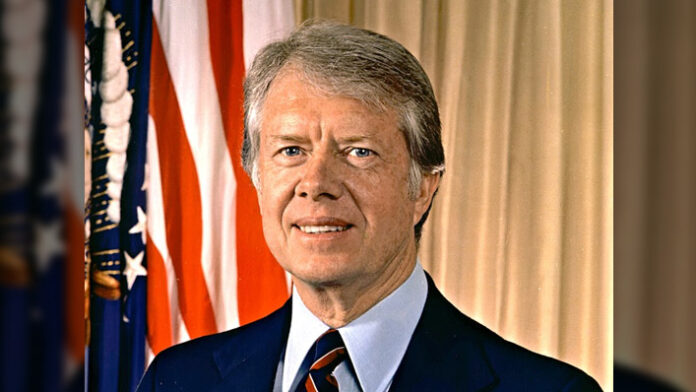Jimmy Carter, the 39th President of the United States and winner of the 2002 Nobel Peace Prize, died peacefully Sunday, Dec. 29, at his home in Plains, Georgia, surrounded by his family. He was 100, the longest-lived president in U.S. history.
Jimmy Carter’s life has long been a testament to the values of compassion, peace, and integrity, deeply rooted in his Christian faith and humanitarian work. His faith influenced significant decisions during his presidency, such as his emphasis on human rights in foreign policy, which shaped agreements like the Camp David Accords and his efforts to establish diplomatic relations with China. These actions reflected his belief in justice and the moral responsibility of leadership. Born on October 1, 1924, in Plains, Georgia, Carter’s legacy reflects his commitment to service, his dedication to faith, and his efforts to make the world a better place.
Early Life and Career of Jimmy Carter
Raised in a devout Christian family, Jimmy Carter’s faith was a cornerstone of his existence from an early age. The Carter family were active members of the Baptist Church, where young Jimmy absorbed the teachings that would guide him throughout his life. His early years were marked by a humble upbringing on a peanut farm, where he learned the virtues of hard work, fairness, and the importance of community.
After graduating from the United States Naval Academy in 1946, Carter embarked on a naval career, which he ultimately left to return to Plains and take over the family business. It was during this period that his political aspirations began to take shape, spurred by his desire to contribute to society and influenced by his strong moral compass.
Presidency (1977-1981)
Jimmy Carter’s presidency, from 1977 to 1981, was characterized by significant achievements and formidable challenges. His administration focused on human rights, energy conservation, and peacekeeping on a global scale. Carter’s Christian faith played a pivotal role in his approach to governance, guiding his efforts to broker peace, as seen in the historic Camp David Accords, and his commitment to humanitarian causes.
Christian Faith
Carter’s faith was not just a personal creed but a driving force behind his extensive post-presidential humanitarian efforts. His lifelong dedication to teaching Sunday school at his local Baptist church, even during his presidency, underscores the depth of his commitment to his faith. Carter’s Christianity informed his views on justice, equality, and the dignity of all human beings, principles that he applied both in office and in his later work with The Carter Center.
Humanitarian Work and Advocacy
After leaving the presidency, Jimmy Carter’s commitment to service found new expression in his humanitarian work, most notably through The Carter Center, founded in 1982. The Center has been instrumental in addressing international conflicts, promoting democracy, and fighting diseases across the globe.
Carter’s faith, with its emphasis on peace, compassion, and equity, has been at the heart of these efforts. His work in eradicating Guinea worm disease, a debilitating parasite affecting some of the world’s poorest communities, is particularly notable. This endeavor reflects his belief in the Christian doctrine of serving the least among us, showcasing how faith can translate into transformative global health initiatives. In 2002, Carter was awarded the Nobel Peace Prize “for his decades of untiring effort to find peaceful solutions to international conflicts, to advance democracy and human rights, and to promote economic and social development.”
Carter’s advocacy for peace and human rights also exemplified his faith in action. He was involved in various peacekeeping missions and efforts to secure human rights, earning widespread admiration for his tireless dedication to these causes.
Final Years and Legacy
In early 2023, the Carter family announced that the former president would be entering hospice care, focusing on comfort and quality of life. This decision brought his life and legacy back into public attention, with an outpouring of support and admiration from people around the world.
As he passed away peacefully at the age of 100, Jimmy Carter’s legacy remains multifaceted, marked by his achievements in office, his post-presidential humanitarian work, and his deep, unwavering Christian faith. His life exemplifies how deeply held beliefs can inspire a lifetime of service to others.
Jimmy Carter’s life journey—from the plains of Georgia to the global stage, from the presidency to humanitarian work—has been guided by his Christian faith. His legacy serves as a testament to the power of living a faith-driven life, challenging future generations to consider how their beliefs can shape their actions and the world around them. Reflecting on Carter’s life, it becomes clear that his faith was not just a personal matter but a catalyst for change, making a profound impact on the world.

